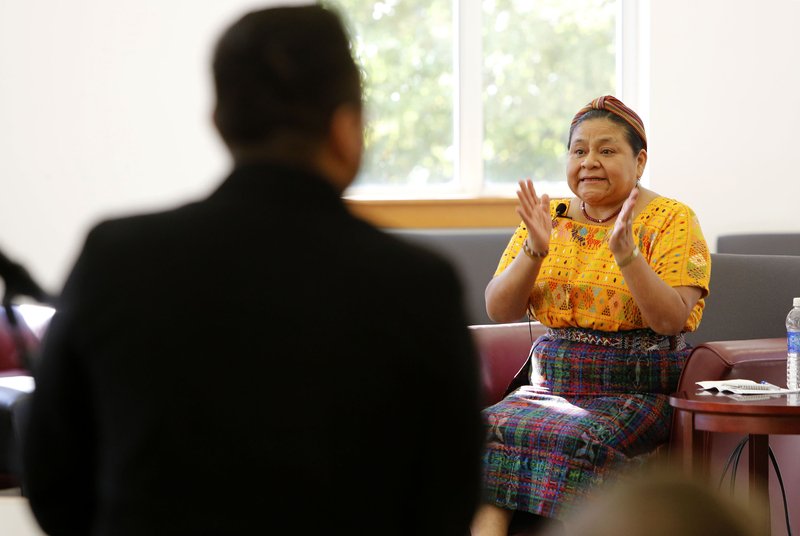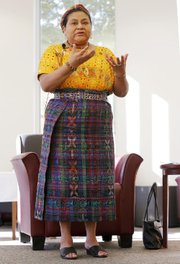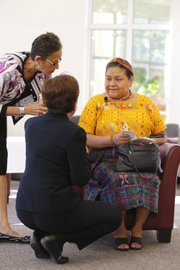FAYETTEVILLE -- Few recognize the many problems that face the world, Nobel Peace Prize winner Rigoberta Menchu said Tuesday, listing armed conflict, drought and the environmental destruction of homelands.
"So then, there is a cause that you should adopt. It doesn't matter what it is," Menchu told a crowd of about 100 people, mostly students, at Mullins Library at the University of Arkansas at Fayetteville.
"I'm for an education that's for life. When one studies, what's the purpose?" she said. "We study to be better people."
Menchu is a member of the K'iche', one of the Maya people indigenous to the Americas. She became known worldwide after the 1983 publication of a testimonial biography, I, Rigoberta Menchu, about her life in war-torn Guatemala.
She won the Nobel Peace Prize in 1992 for her work advocating for the rights of indigenous people and social justice.
Her family suffered greatly during violent conflicts in Guatemala. Menchu told students that her father was burned alive, and other family members were buried in unknown graves.
"One day, I didn't have anything," she said.
But Menchu, who spoke in Spanish, also said she had a desire to learn everything and move forward. A translator repeated her remarks in English.
"I had the will to do something, and I had to do what I felt I had to do," Menchu said. "I think all of you students can do everything you set out to do."
Menchu was brought to campus to deliver the 2015 Winthrop Rockefeller Distinguished Lecture. UA's Latin American and Latino Studies Program and the university's Hispanic Heritage Month Committee received a $24,900 grant from the lecture series to pay for her visit and related expenses.
The Rockefeller lecture was scheduled at the Arkansas Union on Tuesday evening. It was preceded by the morning event at the library, which offered a more informal setting for Menchu to share her experiences and answer questions.
She said that after she received the Nobel Peace Prize, she struggled to find employment but now has a position at the National Autonomous University of Mexico. She also continues advocacy work through her charitable foundation and with other Nobel Peace Prize winners.
In response to a question about her message to young people who weren't born when she received the peace prize, Menchu spoke about the importance of positivity in a world where messages of hate and racism remain widespread.
"All of that is everywhere in the world, and what I do is avoid becoming a part of that. And that's why I'm an optimist," she said.
Throughout her talk, Menchu referred to Mayan spiritual beliefs, including what she said she had learned from some guides.
"Happiness is achieved through oneself," she said.
Metro on 10/14/2015


